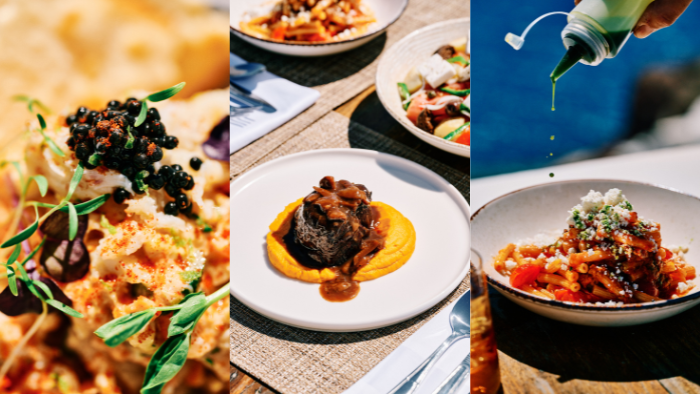Introduction: The Taste of Santorini
Santorini is known for its sunsets and whitewashed houses. Yet there’s another side to the island that many visitors only discover once they sit down at a table — the food. The cuisine here is born from the land itself. Volcanic soil, salty winds, and farming traditions have shaped it for centuries. What once started as simple village meals is now part of a fine dining scene that attracts food lovers from around the world.
The Island’s Fertile Soil and Volcanic Influence
Unique Climate and Soil Composition
Santorini’s landscape is unlike any other in Greece. The big volcanic eruption thousands of years ago left behind soil packed with minerals. The island doesn’t get much rain, but sea mist and pumice stone help crops absorb just enough water to thrive. The result? Ingredients with flavors that are bold and concentrated.
How Volcanic Minerals Enhance Flavor
Unlike other Mediterranean islands, farmers here don’t rely on heavy irrigation. The land itself does the work. Volcanic ash feeds the crops, while porous stones hold in moisture. Vegetables may grow smaller, but their taste is rich and intense.


Iconic Local Ingredients of Santorini
Cherry Tomatoes: Sweet, Juicy, and Historic
Santorini’s cherry tomatoes are tiny but powerful. Grown since the 19th century, they pack sweetness you won’t find anywhere else. The mix of dry soil and salty breeze gives them their special punch.
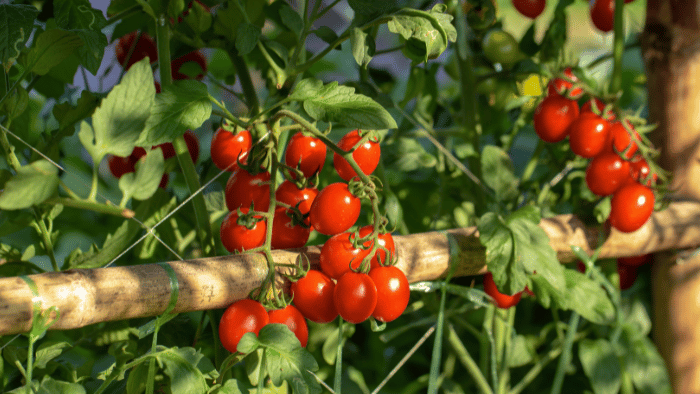
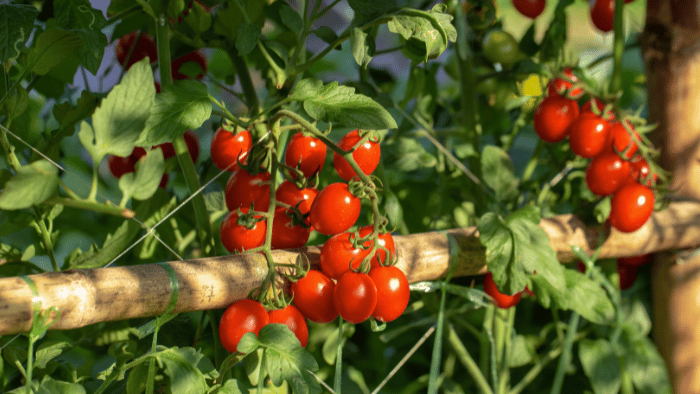
Fava Beans: A Staple of Island Tradition
Santorini fava isn’t the broad bean you might expect. It’s made from yellow split peas, producing a smooth, creamy purée. Protected by a PDO label, it’s found everywhere — from home kitchens to fine dining plates topped with truffle oil.
White Eggplants: A Rare Culinary Treasure
Unlike the purple ones we see elsewhere, Santorini’s eggplants are white, sweet, and not bitter at all. They’re delicious grilled, in moussaka, or reimagined in modern gourmet dishes.
Capers and Herbs from Rocky Terrains
Capers grow wild on rocky cliffs. Sun-dried, they add a salty kick to salads and fish. In addition, herbs like oregano, thyme, and rosemary also thrive here. They give chefs natural flavors to season their menus.
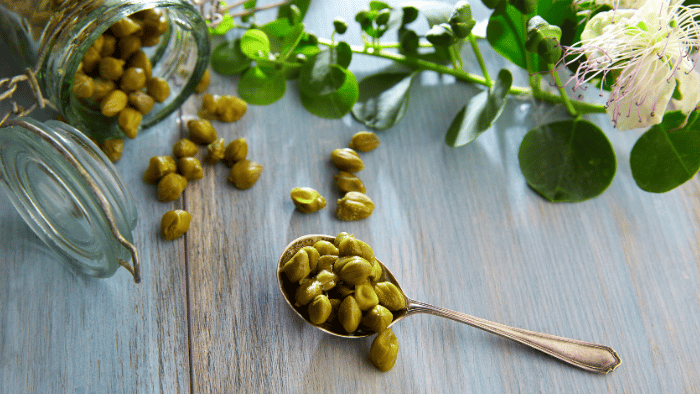
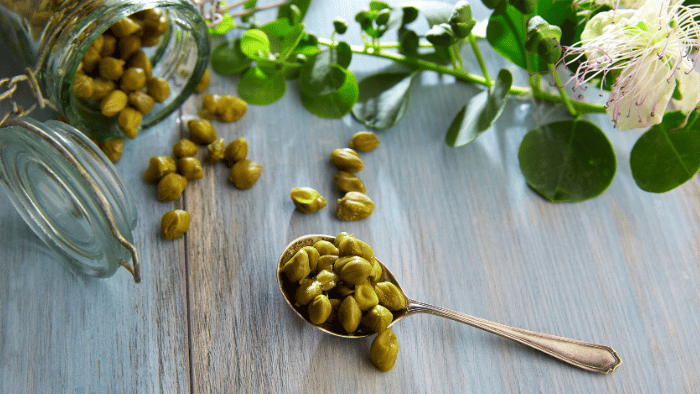
The Role of Local Farmers and Sustainable Practices
Traditional Farming Passed Down Generations
Many farmers still follow age-old methods. They work with the land’s natural cycles and let crops adapt to the dry climate. This “dry farming” method may sound tough, but it makes ingredients full of character.
Organic and Sustainable Agriculture in Santorini
Sustainability isn’t just a trend here. In fact, it’s survival. More farms now use organic techniques to protect both the soil and the island’s future. This keeps biodiversity alive while preserving Santorini’s food heritage.
From Harvest to Kitchen: The Farm-to-Table Movement
Local Markets and Fresh Ingredient Sourcing
Walk through Santorini’s markets and you’ll see chefs handpicking produce early in the morning. They buy fish straight from the fishermen and vegetables directly from farmers.
Chefs Collaborating with Farmers
The island’s best restaurants work hand in hand with growers. This partnership means menus change with the seasons. What’s fresh that month ends up on your plate.
Gourmet Dining Experiences in Santorini
How Chefs Use Local Ingredients
Santorini’s fine dining scene takes humble ingredients and makes them shine. A simple tomato can become a refined reduction. A spoonful of fava purée can be elevated with smoked fish or truffle oil.
Signature Dishes Inspired by Tradition
Some dishes you shouldn’t miss:
- Tomato keftedes, which are crispy fried tomato balls.
- Fava with caramelized onions: creamy, rich, and full of flavor.
- Grilled white eggplant: sweet and smoky with a drizzle of olive oil.
Pairing Local Wine with Island Cuisine
Wine completes the story. The famous Assyrtiko grape produces crisp wines that match perfectly with seafood and vegetable dishes. For something more complex, there’s Nykteri, and for dessert, the amber-colored Vinsanto.
One of the most celebrated spots is Sunsets Santorini in Oia, where chefs use these very ingredients to craft multi-course menus. With a slow dining philosophy and 360° caldera views, it’s a place where local flavors meet world-class presentation.
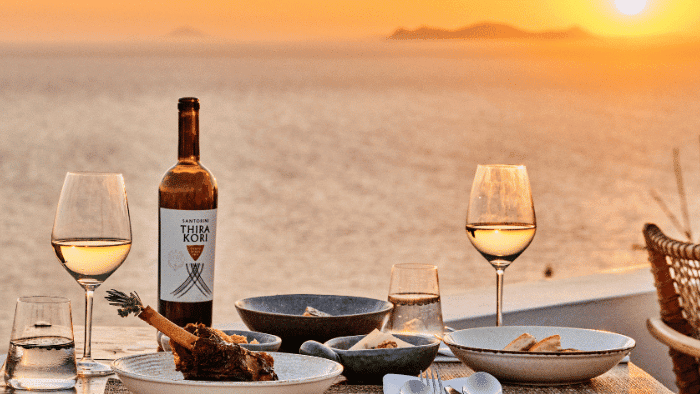
The Global Appeal of Santorini’s Gastronomy
Why Food Travelers Choose Santorini
Travelers don’t just come for the sunset. Many arrive looking for food experiences — cooking classes, wine tours, and farm-to-table dinners are now as popular as cliffside photos.
Santorini’s Influence on Mediterranean Fine Dining
The island’s food philosophy has gone global. Chefs abroad draw inspiration from Santorini’s focus on simplicity and freshness, showing that great cuisine doesn’t need complicated ingredients.
Frequently Asked Questions (FAQs)
Q1. What makes Santorini’s soil special for farming?
It’s volcanic, full of minerals, and porous. This gives crops strong, unique flavors.
Q2. Which dishes best represent Santorini’s farm-to-table cuisine?
Tomato keftedes, fava purée, and white eggplant dishes are true classics.
Q3. Are Santorini cherry tomatoes different from regular ones?
Yes. They’re smaller, sweeter, and grown without irrigation.
Q4. Can you visit local farms in Santorini?
Yes, many farms open their doors to visitors for tours and tastings.
Q5. How do Santorini chefs combine tradition with fine dining?
They take traditional recipes and reimagine them with modern techniques.
Q6. What wine pairs best with Santorini cuisine?
Assyrtiko is the top choice. Its crisp acidity cuts through rich dishes beautifully.
Conclusion: A Culinary Journey from Soil to Plate
Santorini’s cuisine is more than what’s on the plate. It’s the story of an island shaped by fire, sea, and tradition. From volcanic soil to elegant fine dining rooms, every bite tells a story. Whether you try it in a seaside taverna or a Michelin-inspired restaurant, the lesson is the same: the best food begins with the land.
If you’d like to experience the essence of Santorini fine dining, its local flavors, volcanic wines, and the island’s most iconic sunset, you can book a table at Sunsets Santorini and taste the island at its finest.

